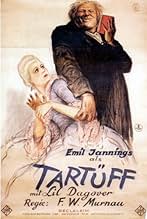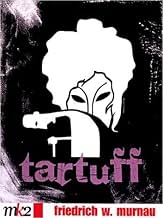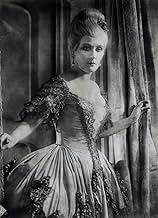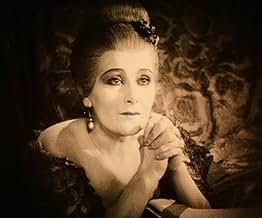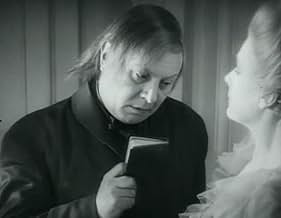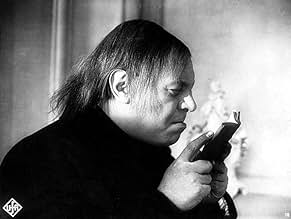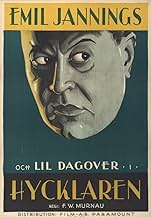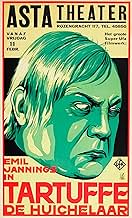AVALIAÇÃO DA IMDb
7,1/10
2,9 mil
SUA AVALIAÇÃO
Adicionar um enredo no seu idiomaA young man shows his millionaire grandfather a film based on Molière's Tartuffe, in order to expose the old man's hypocritical governess who covets his own inheritance.A young man shows his millionaire grandfather a film based on Molière's Tartuffe, in order to expose the old man's hypocritical governess who covets his own inheritance.A young man shows his millionaire grandfather a film based on Molière's Tartuffe, in order to expose the old man's hypocritical governess who covets his own inheritance.
- Direção
- Roteiristas
- Elenco e equipe completos
- Produção, bilheteria e muito mais no IMDbPro
Avaliações em destaque
While this film does not have the amazing scenes with breathtaking cinematography like FAUST or SUNRISE, this Murnau film still does excel due to the camera-work and great care taken in its production. And, while not the very best silent film available, it's certainly among the better ones.
This story differs from Molière's play in that the entire play is actually part of a larger story--with a prologue and epilogue. The story begins with a rich old man living alone with his supposedly devoted housekeeper. She has convinced the man that his grandson is evil and should be disinherited because he is, oh, horrors,...an ACTOR!!! Instead, she's fooled him into making her the beneficiary. When the grandson shows up to say hello, the old man chases him away and it appears the housekeeper has won. However, given that the young man is an actor, he dresses up as a traveling showman and comes to the house to show them a film--TARTUFFE.
The film stars Emil Jannings as the evil priest, Tartuffe, who has fooled a rich nobleman into forsaking the pleasures of life and becoming an aesthetic, like him. But, the man's wife soon realizes the priest is a charlatan and much of the movie is spent trying to trap the priest in his lies. Naturally, all this is symbolic of the relationship between the housekeeper and the rich man.
The sets, direction and acting are all excellent. The acting is rather restrained compared to some silent films and the story is told in a brisk and watchable manner.
This story differs from Molière's play in that the entire play is actually part of a larger story--with a prologue and epilogue. The story begins with a rich old man living alone with his supposedly devoted housekeeper. She has convinced the man that his grandson is evil and should be disinherited because he is, oh, horrors,...an ACTOR!!! Instead, she's fooled him into making her the beneficiary. When the grandson shows up to say hello, the old man chases him away and it appears the housekeeper has won. However, given that the young man is an actor, he dresses up as a traveling showman and comes to the house to show them a film--TARTUFFE.
The film stars Emil Jannings as the evil priest, Tartuffe, who has fooled a rich nobleman into forsaking the pleasures of life and becoming an aesthetic, like him. But, the man's wife soon realizes the priest is a charlatan and much of the movie is spent trying to trap the priest in his lies. Naturally, all this is symbolic of the relationship between the housekeeper and the rich man.
The sets, direction and acting are all excellent. The acting is rather restrained compared to some silent films and the story is told in a brisk and watchable manner.
This is the fourth Murnau i've seen, after Nosferatu, Sunrise and Faust. I admire the work of Murnau for it's beautiful compositions an camera movement. Murnau is able to translate the mood he want's to set into composition and movement without being artsy for the sake of it.
Tartuffe has quiet a story behind it. Apparently, Murnau was forced by contract to make this film. So this film is to Murnau what Spartacus was to Kubrick. Even though it's still a Murnau picture: again Murnau knows how to give a quiet flat story more depth by suggestion and style. I liked the film, it's hasn't got the outdoors scene's that Sunrise and Nosferatu had, or the huge sets and special effect of Faust, but still it remains an exciting film. Don't hold back by the negative reviewers of the film, this is, by all means, not a bad film. It's just that Murnau made so much breathtaking stuff in his other work, that this film seems not so historical interesting. But if you're a fan of Murnau's other work I'm sure you'll like this as well. Make sure you'll watch the Masters of Cinema edition. It has a great documentary about the making of this film. It gave me a lot of new insights about the film and about Murnau.
Tartuffe has quiet a story behind it. Apparently, Murnau was forced by contract to make this film. So this film is to Murnau what Spartacus was to Kubrick. Even though it's still a Murnau picture: again Murnau knows how to give a quiet flat story more depth by suggestion and style. I liked the film, it's hasn't got the outdoors scene's that Sunrise and Nosferatu had, or the huge sets and special effect of Faust, but still it remains an exciting film. Don't hold back by the negative reviewers of the film, this is, by all means, not a bad film. It's just that Murnau made so much breathtaking stuff in his other work, that this film seems not so historical interesting. But if you're a fan of Murnau's other work I'm sure you'll like this as well. Make sure you'll watch the Masters of Cinema edition. It has a great documentary about the making of this film. It gave me a lot of new insights about the film and about Murnau.
As I've discovered after relatively recent viewings of 'Nosferatu (1922),' 'The Last Laugh (1924)' and 'Faust (1926),' F.W. Murnau was one of the most exciting and influential European directors working during the 1920s. His contributions towards early German cinema are rivalled only by Fritz Lang, and his ability to use lighting and shadows to create atmosphere are almost unparalleled. 'Herr Tartüff / Tartuffe (1926)' was apparently forced upon Murnau by contractual obligations with Universum Film (UFA), and you suspect that perhaps his heart wasn't quite in it, but the end result nonetheless remains essential viewing, as are all the director's films. The story is based upon Molière's successful 1664 play, "Tartuffe," which explored the notion of hypocrisy, particularly among self-proclaimed religious "devotees." Murnau and screenwriter Carl Mayer stripped the story to its bare essentials, removing any extraneous supporting characters and creating a close-knit triangle Herr Orgon, Frau Elmire and Tartüff around which the story revolves. Murnau also added an interesting framing device, whereby the story of Tartuffe becomes a film-within-a-film that a young actor shows to his grandfather to warn of his housekeeper's evil intentions.
Interestingly, I found the story's prologue of the old man and his scheming housekeeper to be a more engrossing story than the film that the characters are later shown. The conniving old woman (Rosa Valetti), with a devilish grin like a Cheshire Cat, manages to convince her senile employer (Hermann Picha) that his grandson has dishonoured the family name by becoming an actor, and so she sets herself up to inherit his entire fortune. When the sincere young actor (André Mattoni) finds out about this betrayal, he plans an ingenious stratagem to outwit the malicious housekeeper and convince his grandfather of her evil. Murnau was obviously a great believer in the power of cinema, and so it's no surprise that the young man chooses the cinematic medium with which to reveal the ultimate truth about hypocrites. The film, by employing a few deceptively simple shots, immediately translates the inner motivations driving each character: the housekeeper, greedy and malevolent, kicks aside her master's slippers, whereas the kind, loving grandson delicately sets them back into place. Also notable is a moment during the narrative when the young actor turns to the camera and addresses the audience directly, one of the earliest instances I've seen of a character "breaking the fourth wall."
The tale of Tartuffe himself is also worth watching for its technical accomplishments, even if the story itself seems somewhat generic and uninteresting. Most astounding is Murnau's exceptional use of lighting {assisted, of course, by cinematographer Karl Freund}, and, in many cases, entire rooms are seemingly being illuminated only by candlelight. This story concerns a happily-married woman, Frau Elmire (Lil Dagover), who is distraught to discover that her beloved husband, Herr Orgon (Werner Krauss), has become obsessed with Tartüff (the great Emil Jannings), a grotesque little man who speaks with divine importance and claims to be a Saint. However hard she tries, Elmire cannot convince Orgon that he has been duped by a religious fraud, so great is the cunning of Tartüffe's deception. In the film, Jannings predictably gives the finest performance, playing the unsavoury title character with a mixture of sly arrogance and lustful repugnance. Nevertheless, the role falls far short of the silent actor's greatest performances, which include Mephisto of 'Faust (1926)' and the hotel porter from 'The Last Laugh (1924).'
Interestingly, I found the story's prologue of the old man and his scheming housekeeper to be a more engrossing story than the film that the characters are later shown. The conniving old woman (Rosa Valetti), with a devilish grin like a Cheshire Cat, manages to convince her senile employer (Hermann Picha) that his grandson has dishonoured the family name by becoming an actor, and so she sets herself up to inherit his entire fortune. When the sincere young actor (André Mattoni) finds out about this betrayal, he plans an ingenious stratagem to outwit the malicious housekeeper and convince his grandfather of her evil. Murnau was obviously a great believer in the power of cinema, and so it's no surprise that the young man chooses the cinematic medium with which to reveal the ultimate truth about hypocrites. The film, by employing a few deceptively simple shots, immediately translates the inner motivations driving each character: the housekeeper, greedy and malevolent, kicks aside her master's slippers, whereas the kind, loving grandson delicately sets them back into place. Also notable is a moment during the narrative when the young actor turns to the camera and addresses the audience directly, one of the earliest instances I've seen of a character "breaking the fourth wall."
The tale of Tartuffe himself is also worth watching for its technical accomplishments, even if the story itself seems somewhat generic and uninteresting. Most astounding is Murnau's exceptional use of lighting {assisted, of course, by cinematographer Karl Freund}, and, in many cases, entire rooms are seemingly being illuminated only by candlelight. This story concerns a happily-married woman, Frau Elmire (Lil Dagover), who is distraught to discover that her beloved husband, Herr Orgon (Werner Krauss), has become obsessed with Tartüff (the great Emil Jannings), a grotesque little man who speaks with divine importance and claims to be a Saint. However hard she tries, Elmire cannot convince Orgon that he has been duped by a religious fraud, so great is the cunning of Tartüffe's deception. In the film, Jannings predictably gives the finest performance, playing the unsavoury title character with a mixture of sly arrogance and lustful repugnance. Nevertheless, the role falls far short of the silent actor's greatest performances, which include Mephisto of 'Faust (1926)' and the hotel porter from 'The Last Laugh (1924).'
Based on Moliere's classic seventeenth century comedy, this version of TARTUFFE has the eponymous antihero (Emil Jannings) being ultimately outwitted by the family; at the same time the head of the family Orgon (Werner Krauss) remains as blissfully unaware of how to distinguish truth from falsity as he did at the beginning. F. W. Murnau's version is set in a large, rambling house, full of wide staircases and plenty of doors. He proves himself a master of the camera; his close-ups focusing on the pockets as Tartuffe stashes away his ill-gotten gains while pretending to embrace religion, or on Elmire's (Lil Dagover's) breasts, as Tartuffe tries and fails to keep his hands from touching them. Jannings is given full rein to show off his range of facial expressions as Tartuffe; here is a genuinely evil man who believes he can do anything under the cloak of religion. What makes this TARTUFFE most interesting, at least for students of history, is the specially-added prologue and epilogue, in which a young man (André Mattoni) shows his wealthy grandfather (Hermann Picha) the film of TARTUFFE, in order to alert him to the old man's hypocritical governess (Rosa Valetti), and her designs on his fortune. The young man is impoverished, but shown to be much more able to understand human behavior than his grandfather. Through this device Murnau takes a pot-shot at how capitalism and wealth often destroys judgment, creating a covetous society in which everyone is out for themselves. This could be a microcosm of Germany in the mid- Twenties, before the Nazi accession to power. This TARTUFFE moves along at a brisk pace, complemented by a jaunty soundtrack. Worth watching.
A wealthy, elderly man is being taken care of by an evil housekeeper who is working to be the heir to his fortune. While she navigates her plan, she is slowly poisoning him. Along comes his disowned grandson, an actor, who sees through the housekeeper's plans. He sets up a movie version of Moliere's Tartuffe, which is about a man who blindly follows a charlatan, Tartuffe, who is working to become heir to a fortune as well. The Tartuffe film is slow moving and has trouble getting around to the climax, but it's still interesting. Not Murnau's best, but worth a look.
Você sabia?
- CuriosidadesCamilla Horn served as Lil Dagover's foot double in this film. This small role effectively launched her lengthy acting career, as she was noticed by director F.W. Murnau and cast as the lead actress in his film, Fausto (1926).
- Versões alternativasThis film was published in Italy in an DVD anthology entitled "Il castello di Vogelod", distributed by DNA Srl. The film has been re-edited with the contribution of the film history scholar Riccardo Cusin . This version is also available in streaming on some platforms.
- ConexõesFeatured in Dämonische Leinwand - Der deutsche Film der zwanziger Jahre (1998)
Principais escolhas
Faça login para avaliar e ver a lista de recomendações personalizadas
Detalhes
- Tempo de duração1 hora 14 minutos
- Cor
- Mixagem de som
- Proporção
- 1.33 : 1
Contribua para esta página
Sugerir uma alteração ou adicionar conteúdo ausente

